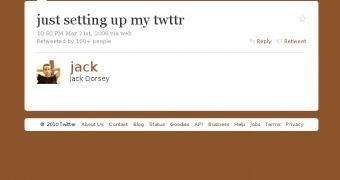Most people only heard about Twitter last year, and how could they not with all the media frenzy, but the microblogging service is now four years old, having celebrated its birthday yesterday, 21st of March. It started out innocuous enough, but these days Twitter has the power to change the world. Or, at least, that's what its biggest supporters would like to believe.
It all started out March 21, 2006, with a tweet from creator Jack Dorsey, "just setting up my twittr." Not necessarily memorable but there you have it, the very first tweet. Of course, at the time it wasn't even called a tweet and the service was actually quite a bit different, at least in its goals. Having sold the very popular Blogger to Google for a truckload of money, Evan Williams and Biz Stone were looking at a new challenge.
Having been one of blogging's pioneers, they were still skewed towards the concept of blogging. The idea, coming from Jack Dorsey, was to have mobile-oriented service which would allow a group of people to communicate via SMS and also have their conversations stored in a persistent location. That's far from how most people use it today, but the core service works exactly the same.
Twitter really started taking off a year later at the 2007 SXSW conference, where it became an instant hit and also won the Web Award. After that, it became a hip service for the tech-savvy crowd, adding more and more users but remaining relatively small for almost two more years.
It was spring 2009 that Twitter use exploded coming into the mainstream with a bang and pretty much defining the web during the last year. Even now, anything even remotely having to do with Twitter is picked up by the mainstream media and the service still enjoys quite a lot of hype. Spurred by the famous competition between Ashton Kutcher and CNN to be the first to reach one million followers on Twitter and later by Oprah joining it, for several months the service saw huge growth.
It also became known for its role in the Iranian election protests, recently for how it was used after the devastating Haiti earthquakes and it is heavily used during any worldwide or important event. It also pretty much brought the world the 'real-time web' and changed the way many people consume news.

 14 DAY TRIAL //
14 DAY TRIAL //